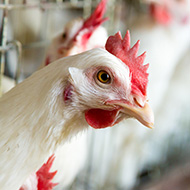Funding boost for chicken welfare research

The system will allow researchers to monitor large number of birds and track their activity.
A Queen's University Belfast (QUB) academic has received more than $300,000 in funding for research to enhance the welfare of farmed chickens.
Professor Niamh O’Connell, from the Institute for Global Food Security (IGFS), has been named of one of six recipients funded in Phase 1 of the SMART Broiler programme.
Together with Northern Ireland poultry producer Moy Park, Professor Connell will use the funding to develop a vision-based system to track and monitor the behaviour of a flock of chickens.
The system will allow researchers to monitor large numbers of birds, track their activity patterns and gather welfare indicators such as gait and feather cleanliness.
Commenting on the award, Professor O’Connell said: "We are delighted to receive this research funding. Using vision-based technologies to monitor animal behaviour offers enormous opportunities to the agri-food sector.
“Working with Moy Park, this project will trial the technology with poultry and will help us better understand how the birds engage with their environment and each other. We're particularly interested in indicators of positive emotion or 'happiness' such as play."
The SMART Broiler research initiative is awarding more than $4 million in grants and technical support to develop automated monitoring tools that precisely assess chicken welfare.
Ursula Lavery, technical and R&D director Europe at Moy Park said: “We are passionate about understanding our birds even more and are excited to continue our work in partnership with Prof O’Connell and the QUB team. This project offers the potential to really bring a step-change in how we measure the positive welfare indicators of our birds.”



 The Federation of Independent Veterinary Practices (FIVP) has announced a third season of its podcast, Practice Matters.
The Federation of Independent Veterinary Practices (FIVP) has announced a third season of its podcast, Practice Matters.